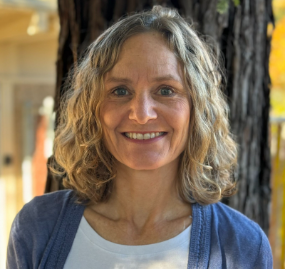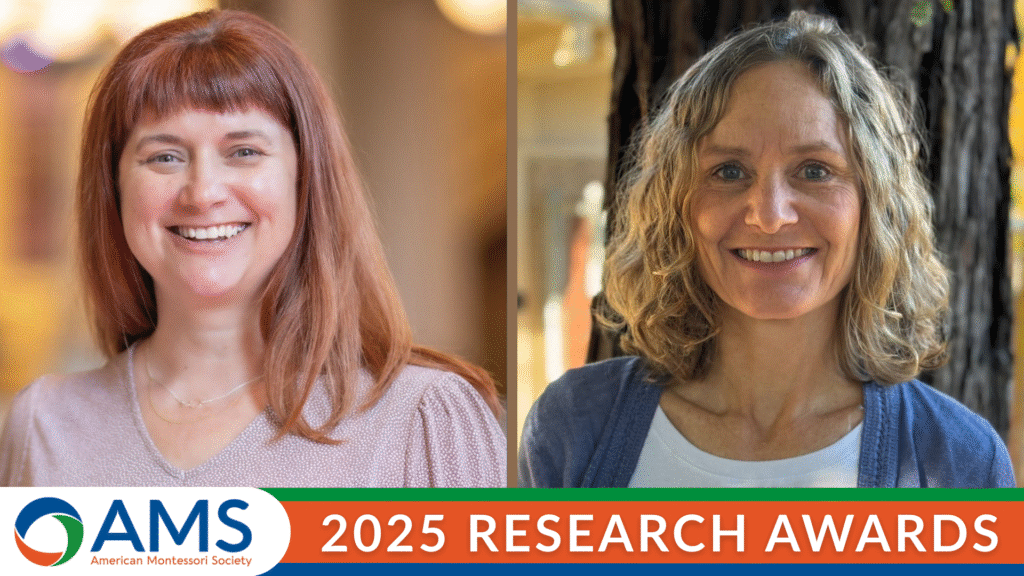The American Montessori Society offers annual awards for graduate-level work that furthers the understanding of Montessori education. We extend our congratulations to this year’s recipients, and thank them for their contributions to the field.
Annual awards of up to $1,000 are available for graduate-level research that furthers the understanding of Montessori education. This year’s winners for Outstanding Doctoral Dissertation were Dr. Heather Gerker (first place) and Dr. Sharra Weasler (second place).
Dr. Heather Gerker, 1st Place Winner
Heather Gerker, Ph.D., is an associate researcher at the University of Kansas, specializing in Montessori education and learner agency. She recently completed her Ph.D. in Educational Policy at the University of Cincinnati.

With over twenty years of experience in the Montessori field, Dr. Gerker is an AMS-credentialed early childhood educator who has held roles as a teacher, teacher educator, and director of a teacher education program. She has made significant contributions to the Montessori community, serving on the AMS Research Committee, as a board member for the Montessori Public Policy Initiative, a partner in the Montessori Research Collective, and as Editorial Assistant for the Journal of Montessori Research.
Dr. Gerker’s work also includes initiatives that bridge research and practice, such as the U40: Montessori for the Future Summit 2023 hosted by AMS and AMI/USA and the AMS publication Montessori in Contemporary Culture.
About the Winning Dissertation
Dr. Gerker conducted an explanatory sequential mixed methods study for her dissertation research. The first phase of the study explored the political efficacy of Montessori teachers and how, if at all, they engage in policy advocacy through a quantitative survey. In the second phase of the study, a participatory method was used to explore teachers’ experiences with policies and co-develop recommendations for educational leaders and policymakers, underscoring the critical importance of teacher voice and experiences in the policymaking process.
Key findings revealed that Montessori teachers feel underprepared to engage in policy advocacy, yet they believe collective action can drive meaningful change in educational policy. The study also highlights the need for improved support systems for Montessori teachers, suggesting that enhancing their understanding of policy processes could strengthen their advocacy efforts. Study participants also proposed recommendations for conditions required to foster their engagement in advocacy.
Dr. Sharra Weasler, 2nd Place Winner
After spending many years in traditional education, Sharra was introduced to the magic of Montessori through her children’s Primary and elementary experiences. She completed the AMI Primary training and taught at the early childhood level for 5 years before becoming Director at Corte Madera Montessori in Marin County, California. Sharra decided to pursue a doctorate degree because she believed in the importance of expanding the Montessori-related research base.

She hopes to use her research to support access to and excellence in public Montessori programs. Sharra lives with her husband and daughter (her son has flown the coop) and in her free time loves to explore Northern California’s great outdoors on skis, bike, and foot!
About the Winning Dissertation
Over the past 30 years, hundreds of millions of dollars have been poured into reading research, creating the body of knowledge known as the science of reading (SOR). Despite the Montessori Method’s comprehensive curriculum focused on learning to read, SOR does not include Montessori classrooms nor the expertise of reading teachers (Montessori or other), in its studies.
In this dissertation, Weasler used interviews with experienced Montessori teachers and classroom observations to study the process of learning to read in the Montessori early childhood classroom. Based on this data, through grounded-theory-based data analysis, she developed a new model of reading development. This model adds important features, such as encoding as a precursor to decoding and the development of metalinguistic cognition, to SOR-based models of reading.
In addition, Weasler used the interview data to develop a model of Montessori pedagogy which is closely aligned with reading motivation theory. Finally, this research illustrates the validity of Montessori teachers as valuable sources of research data.


